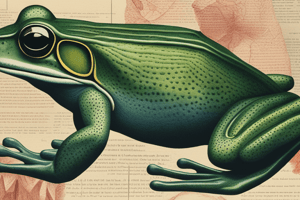Podcast
Questions and Answers
What unique feature do male frogs have that distinguishes them from female frogs?
What unique feature do male frogs have that distinguishes them from female frogs?
- Longer hind limbs
- Colorful skin patterns
- Additional digits on forelimbs
- Presence of vocal sacs (correct)
Which part of the frog's anatomy serves to protect the eyes while it is in water?
Which part of the frog's anatomy serves to protect the eyes while it is in water?
- Tympanum
- Nictitating membrane (correct)
- Vocal sacs
- Forelimbs
What structural characteristic of the hind limbs in frogs aids in swimming?
What structural characteristic of the hind limbs in frogs aids in swimming?
- Webbed digits (correct)
- Longer length than forelimbs
- Muscular build
- Reduced number of digits
How does the structure of the digestive system in frogs relate to their carnivorous diet?
How does the structure of the digestive system in frogs relate to their carnivorous diet?
What is the role of the gall bladder in the digestive system of frogs?
What is the role of the gall bladder in the digestive system of frogs?
In frogs, which organ system includes the structures that facilitate gas exchange?
In frogs, which organ system includes the structures that facilitate gas exchange?
What is the purpose of the membranous tympanum in frogs?
What is the purpose of the membranous tympanum in frogs?
What anatomical feature allows frogs to perform various locomotor activities such as leaping and burrowing?
What anatomical feature allows frogs to perform various locomotor activities such as leaping and burrowing?
What classification does the common frog found in India, Rana tigrina, belong to?
What classification does the common frog found in India, Rana tigrina, belong to?
What term describes frogs that do not maintain a constant body temperature?
What term describes frogs that do not maintain a constant body temperature?
Which term is used for the protective coloration that frogs exhibit to blend in with their surroundings?
Which term is used for the protective coloration that frogs exhibit to blend in with their surroundings?
What is the term used to describe the shelter taken by frogs during extreme cold?
What is the term used to describe the shelter taken by frogs during extreme cold?
What characteristic does the skin of frogs possess that contributes to its moist condition?
What characteristic does the skin of frogs possess that contributes to its moist condition?
What is the color of the ventral side of a frog's body?
What is the color of the ventral side of a frog's body?
What anatomical features are absent in the body structure of a frog?
What anatomical features are absent in the body structure of a frog?
How do frogs absorb water?
How do frogs absorb water?
What major benefit does the organization of cells into tissues, organs, and organ systems provide to multicellular organisms?
What major benefit does the organization of cells into tissues, organs, and organ systems provide to multicellular organisms?
Which type of tissue is NOT mentioned as part of the heart's composition?
Which type of tissue is NOT mentioned as part of the heart's composition?
What term refers to the study of the external features of organisms?
What term refers to the study of the external features of organisms?
Which of the following combinations best describes the hierarchical organization in multicellular organisms?
Which of the following combinations best describes the hierarchical organization in multicellular organisms?
What is the aspect of development that showcases a progressive pattern in the complexity of organs and organ systems?
What is the aspect of development that showcases a progressive pattern in the complexity of organs and organ systems?
What does the term 'anatomy' conventionally refer to in the context of animal study?
What does the term 'anatomy' conventionally refer to in the context of animal study?
Which tissue type is responsible for contraction and movement in organs such as the heart?
Which tissue type is responsible for contraction and movement in organs such as the heart?
Which statement about tissues forming organs is correct?
Which statement about tissues forming organs is correct?
What is the primary function of the kidneys in frogs?
What is the primary function of the kidneys in frogs?
Which of the following structures is NOT part of the frog's excretory system?
Which of the following structures is NOT part of the frog's excretory system?
What type of animal is a frog classified as based on its method of excretion?
What type of animal is a frog classified as based on its method of excretion?
Which gland is primarily responsible for chemical coordination in the frog's body?
Which gland is primarily responsible for chemical coordination in the frog's body?
What anatomical feature distinguishes the urinary bladder in frogs?
What anatomical feature distinguishes the urinary bladder in frogs?
What is the role of the ureters in male frogs?
What is the role of the ureters in male frogs?
Which of the following structures is a functional unit of the frog's kidney?
Which of the following structures is a functional unit of the frog's kidney?
Which of the following endocrine glands is NOT found in frogs?
Which of the following endocrine glands is NOT found in frogs?
Which structure serves as a chamber for the excretion of waste and reproductive substances in frogs?
Which structure serves as a chamber for the excretion of waste and reproductive substances in frogs?
What type of fertilization occurs in frogs?
What type of fertilization occurs in frogs?
How many ova can a mature female frog lay at one time?
How many ova can a mature female frog lay at one time?
What is the function of vasa efferentia in the male reproductive system of frogs?
What is the function of vasa efferentia in the male reproductive system of frogs?
What role do frogs play in the ecological balance?
What role do frogs play in the ecological balance?
What connects the ovaries to the cloaca in female frogs?
What connects the ovaries to the cloaca in female frogs?
Which part of the male frog reproductive system is adhered to the kidneys?
Which part of the male frog reproductive system is adhered to the kidneys?
What metamorphic stage does a tadpole undergo to become an adult frog?
What metamorphic stage does a tadpole undergo to become an adult frog?
Study Notes
Organ and Organ Systems
- Division of labor among cells, tissues, organs, and organ systems is essential for the survival of multicellular organisms.
- Basic tissues organize to form organs, which work together as organ systems.
- Each organ comprises one or more types of tissues, such as the heart which contains epithelial, connective, muscular, and neural tissues.
- Evolutionary trends in organ complexity can be observed.
Frog Overview
- Frogs are amphibians belonging to the phylum Chordata, capable of living both on land and in freshwater.
- Common species in India is Rana tigrina.
- Frogs are cold-blooded (poikilotherms) and their body temperature varies with the environment.
- They can camouflage by changing color, aiding in predator evasion.
- Summer sleep (aestivation) and winter sleep (hibernation) occur during extreme weather conditions.
Morphology
- Frog skin is smooth and slippery due to mucus, maintained in a moist condition.
- Dorsal skin is typically olive green with dark spots; ventral skin is pale yellow.
- Body is divided into head and trunk, lacking a neck and tail.
- Features include bulging eyes covered by a nictitating membrane, and a membranous tympanum for sound.
- Forelimbs have four digits, hind limbs five, with webbed feet for swimming.
- Sexual dimorphism present; males have vocal sacs and copulatory pads.
Anatomy
- Frog body cavity accommodates multiple systems: digestive, circulatory, respiratory, nervous, excretory, and reproductive.
- Digestion involves a short alimentary canal suitable for a carnivorous diet; mouth leads to a buccal cavity, then esophagus, stomach, intestine, rectum, and cloaca.
- Liver secretes bile stored in the gall bladder; blood circulation is maintained by a muscular heart.
- Excretory system includes kidneys, ureters, cloaca, and urinary bladder; frogs are ureotelic, excreting urea.
Excretory System
- Kidneys are dark red, bean-shaped, with nephron units for waste separation.
- Male ureters function as urinogenital ducts; female ureters and oviducts open separately into cloaca.
- Urinary bladder is located ventrally; waste removal occurs through kidneys.
Reproductive System
- Male frogs have paired yellowish testes, connected to kidneys via vasa efferentia.
- Cloaca enables expulsion of feces, urine, and sperm.
- Female frogs have ovaries near kidneys; they produce 2500-3000 ova at once, undergoing external fertilization in water.
- Early development includes a larval tadpole stage, which metamorphoses into an adult frog.
Ecological Importance
- Frogs help control insect populations and maintain ecological balance.
- Serve as a crucial part of food chains and webs.
- In some cultures, frog legs are consumed as food.
Studying That Suits You
Use AI to generate personalized quizzes and flashcards to suit your learning preferences.
Related Documents
Description
Explore the fascinating structure and functionality of organ systems in multicellular organisms, with a focus on amphibians like frogs. Learn about the evolutionary trends in organ complexity and the unique characteristics of frogs, including their adaptations for survival in varied environments. This quiz will test your knowledge on organ systems and frog morphology.





